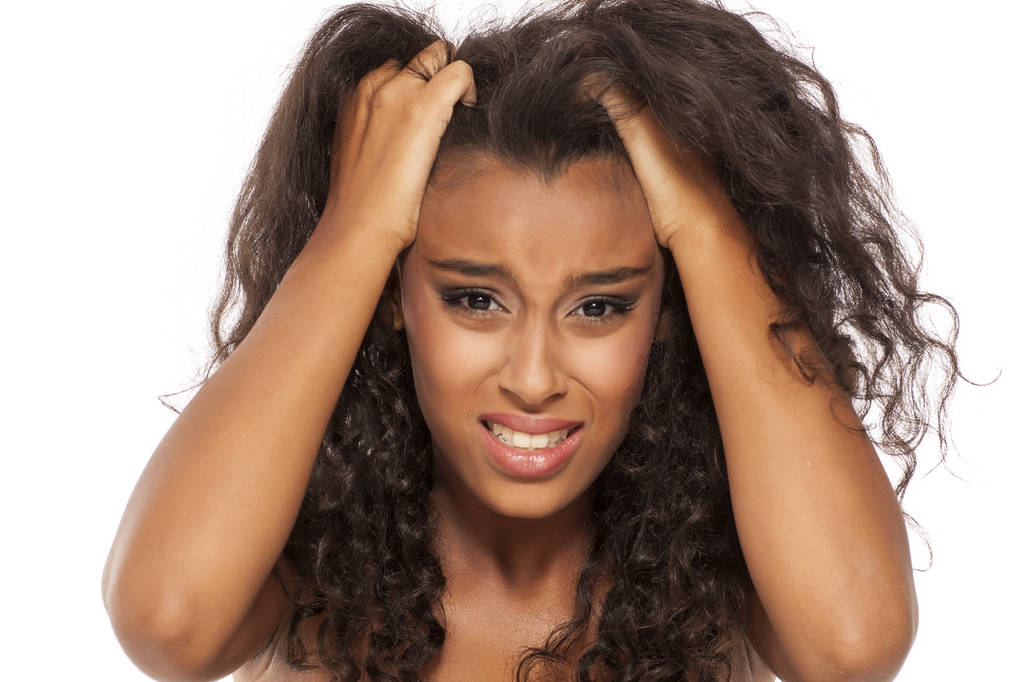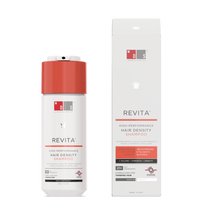
It’s common for an itchy scalp to come out of nowhere at any time of the year and cause relentless discomfort. This experience, however, can be alarming if it’s new and unexpected. There are various reasons for constant scalp itching, most of which are normal, while others may be more serious. Today, let’s talk about the ten common causes of an itchy scalp and tips to help you address them effectively.
Product Build-up
Let’s begin with the most common culprit: product build-up. We all love our hair products, but sometimes, they can leave behind a residue that clogs our pores and irritates our scalp. We end up dealing with a tight, itchy sensation on the scalp, often accompanied by flakiness or dandruff-like build-up.
The solution? Give your locks a break and switch to a gentle, purifying shampoo and conditioner for a week or two to help get rid of the product build-up.
Dandruff
Does an itchy, flaky scalp with visible white or yellow flakes in the hair or shoulders sound familiar? That’s dandruff! Those pesky white flakes can be a real confidence killer. But don’t worry because it’s a common condition caused by an overgrowth of a fungus (Malassezia), which feeds on the oils on the scalp.
So, what’s the treatment for itchy scalp caused by dandruff? Simply use a medicated dandruff shampoo with ingredients like selenium sulphide or zinc pyrithione. Such ingredients can help control the fungal growth & reduce flakiness.
Seborrheic Dermatitis
Don’t let the name scare you: seborrheic dermatitis is a type of eczema that causes red, scaly patches on the scalp. These patches often come with an intense itch and sometimes greasy or waxy build-up. The triggers for this skin condition vary, but they can include stress, hormonal changes, or even weather conditions.
A gentle, fragrance-free shampoo and a steroid lotion or ointment can help soothe the itch and calm the inflammation. Consider home remedies, too, like an apple cider vinegar rinse, which can help restore pH balance and relieve itching. It’s also best to have your skin checked by a medical professional. That way, you can manage the symptoms more effectively.
Psoriasis
Psoriasis is a chronic autoimmune condition characterised by a rapid buildup of skin cells, and it’s one of the most common reasons for an itchy scalp. It’s not contagious, but it can cause patches that can be incredibly itchy, red, scaly & uncomfortable.
The solution? Besides consulting a dermatologist for prescription treatment, you can look for shampoos containing coal tar or salicylic acid to help slough off those pesky scales and ease the itch. Topical steroids like clobetasol can also reduce scalp inflammation and itching; just ask your doctor whether these are suitable for you.

Allergic Reaction
Can allergies cause an itchy scalp? Have you recently switched hair products and noticed an itchy rash or bumps on your scalp? You may have a sensitive scalp and be dealing with an allergic reaction. Common culprits include hair dyes, shampoos, and conditioners. The solution is simple. Identify the offending product, ditch it, and switch to gentle, fragrance-free alternatives. You can also consider using antihistamines and calamine lotion to get relief from itching caused by hives or allergic reactions. Don’t hesitate to consult a dermatologist if the allergic reaction is severe.
Head Lice
Have you asked yourself, “Why is my scalp suddenly itchy?”
Now, let’s talk about the dreaded head lice. These tiny critters can cause an intense, relentless itch as they feed on your scalp. You may also see visible nits (lice eggs) in your hair strands. If you suspect you’ve been infested, it’s time to break out the lice treatment. Also, clean your home thoroughly since lice can spread through shared personal items and living spaces. Doing so helps prevent the nasty re-infestation.
Ringworm
Ringworm can cause circular patches of hair loss and an itchy, red rash on the scalp. It’s a fungal infection caused by a group of fungi called dermatophytes. There’s no other way to get relief than using an antifungal shampoo and taking dermatologist-prescribed oral medication. It will clear the ringworm and the accompanying itchy rashes on your scalp while allowing your hair to regrow.
Atopic Dermatitis
Also known as eczema, atopic dermatitis is one of the most common causes of itchy, dry scalp. The patches on the scalp can also be red, cracked, or oozing.
Can stress cause an itchy scalp? Eczema triggers can include stress, harsh hair products, or even the weather. How can you best address it? Use gentle, fragrance-free hair products and steroid cream to help soothe the itch and keep flare-ups at bay. You should also try meditation and other stress-management activities if you’re dealing with stress-induced eczema flare-ups on your scalp.
Nerve Issues
Do you experience a persistent, tingling, or burning itch on the scalp that can be difficult to scratch or relieve? In some cases, an itchy scalp can be a sign of a nerve problem or neuropathy. The causes of nerve issues may include shingles, diabetes, or scarring from hair loss. If you suspect a nerve issue, it’s best to consult a dermatologist for proper diagnosis and treatment, which may include medications or nerve blocks.
Skin Cancer
While rare, skin cancer on the scalp can sometimes cause itching. It can be an itchy or irritated patch on the scalp that may be raised, discoloured, or bleeding. If you notice unusual growths or patches on your scalp, seek immediate medical attention. It’s critical to have your condition checked to get a proper diagnosis and suitable treatment plan, which may involve surgery, radiation, or other therapies.
Final Thoughts
There you have it, the top ten causes of an itchy scalp and how to find sweet relief. Other than the tips we’ve mentioned, note that a little self-care goes a long way, so be kind to your locks and scalp. More importantly, don’t hesitate to seek professional help if the itch persists.

















